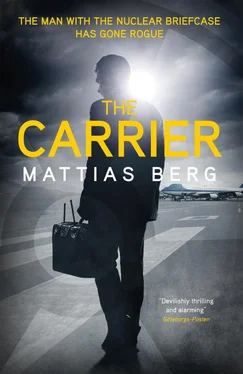Mattias Berg - The Carrier
Здесь есть возможность читать онлайн «Mattias Berg - The Carrier» весь текст электронной книги совершенно бесплатно (целиком полную версию без сокращений). В некоторых случаях можно слушать аудио, скачать через торрент в формате fb2 и присутствует краткое содержание. Город: London, Год выпуска: 2019, ISBN: 2019, Издательство: MacLehose Press, Жанр: Триллер, на английском языке. Описание произведения, (предисловие) а так же отзывы посетителей доступны на портале библиотеки ЛибКат.
- Название:The Carrier
- Автор:
- Издательство:MacLehose Press
- Жанр:
- Год:2019
- Город:London
- ISBN:978-0-85705-788-4
- Рейтинг книги:4 / 5. Голосов: 1
-
Избранное:Добавить в избранное
- Отзывы:
-
Ваша оценка:
- 80
- 1
- 2
- 3
- 4
- 5
The Carrier: краткое содержание, описание и аннотация
Предлагаем к чтению аннотацию, описание, краткое содержание или предисловие (зависит от того, что написал сам автор книги «The Carrier»). Если вы не нашли необходимую информацию о книге — напишите в комментариях, мы постараемся отыскать её.
The Carrier — читать онлайн бесплатно полную книгу (весь текст) целиком
Ниже представлен текст книги, разбитый по страницам. Система сохранения места последней прочитанной страницы, позволяет с удобством читать онлайн бесплатно книгу «The Carrier», без необходимости каждый раз заново искать на чём Вы остановились. Поставьте закладку, и сможете в любой момент перейти на страницу, на которой закончили чтение.
Интервал:
Закладка:
She knocked back her third tequila, I kept sipping on my first.
“All of that medical crap I had to learn afterward. Which gave me the chance to do a ton of different things, anesthetic optional, but in the end someone always managed to get in the way. A whole posse by the operating table just to stop me from doing what we all actually wanted. Even when I put the chip into Kurt, so we could keep track of John too since they always moved in pairs, Ingrid was standing there cheering me on—but she never let me go any further. Went on about how she was saving me for some bigger assignment, that she didn’t want to waste me in that way, always messing about with her witchery, you know. Erasmo, you know, don’t you, all those fucking mind games.”
She looked at me again, seemed to be driving at something specific. I stared into my glass, downed my second shot while she pressed the button to summon the steward. Her story was almost finished. Only its climax remained.
“I stumbled in on her, Erasmo. As she was digging around in the medicine cabinet, to which only Ed and I were meant to have the key, the one with the really heavy stuff. She was probably thinking of doing the interventions herself. Just imagine: you two wouldn’t have turned out very pretty. But now I made her promise me I could join the flight too. Take down John and Kurt, in that order, when the opportunity arose. Granted me that in the end, after half a fucking life—in return for my silence.”
I sank my third tequila at this point too, so I could order more when the steward came.
“And that must have been why she went skiing on that mountain the other day, like she was offering herself so I could take down Kurt. For my fucking sake, Erasmo. To keep her promise.”
Then she reached into her pocket and brought out the syringe that we always had in our packs: pre-loaded with whatever was necessary to stop us from ever revealing any secrets to the wrong people. With a practiced movement she gave herself a shot in the thigh.
I had no idea what it contained. If it was something instantly lethal or perhaps the opposite: for casual enjoyment or maybe longer-term escape from reality. Whatever it was, Jesús María fell asleep immediately. Leaving me with the rest of my questions.
About her, about Ingrid, Sixten, Lise Meitner. The whole story.
5.02
The established view is that Meitner’s conscience would not allow her to get involved in military research. But a letter in the Stockholm archives paints a slightly different picture.
It is dated January 1915, and is addressed to her friend and colleague of many years, Otto Hahn. When Hahn received the letter, he was working as a field researcher in the German war-gas project. It appears to be a reply to an earlier letter from Hahn, which available sources suggest has been lost, in which he presumably expresses a certain crisis of conscience about his work. This is what Meitner writes:
“I think I know roughly what you are working on and can very well understand your doubts. But on this occasion I am sure you are right. One has to be adaptable. In the first place, you were not consulted. Secondly, if you don’t do this, others will. Above all, whatever helps to shorten this dreadful war is an act of compassion.”
I have had the letter analyzed by a graphologist, to try to confirm Meitner as its author, and he had no doubts. It seems to shed new light on her: the only significant researcher in the field who chose not to join the Manhattan Project and contribute to the construction of the atom bomb. But if Meitner could justify Hahn’s military research effort with this type of argument, saying that it could “shorten this dreadful war” or that other people would do it if he did not, she may have seen the development of the atom bomb in the same light.
What Hahn was working on during the First World War was something that must be regarded as the next worst weapon of mass destruction in history. Namely, ingenious gas grenades with two chemical components—in part a substance which first forced its way through the gas mask and impelled the soldier to tear it off in panic, and also the deadly poison which was then free to enter the lungs and tissue unhindered.
Yet Meitner wrote her letter to Hahn relatively early: at the age of thirty-five. With an enormous passion for science which in her letters in the Stockholm archives often seems to overshadow everything else. The same year, 1915, Meitner expressed herself thus to her closest friend:
“I love physics, and have difficulty in imagining it not being a part of my life. It is an almost personal passion, as if for another human being. And I am, despite the fact that I otherwise have a strong moral sense, a woman physicist without the least guilty conscience.”
For a long time she and science seemed to be made for each other. In 1905 Meitner had become the second woman to defend her doctoral thesis in physics at Vienna University. Then the first woman to be allowed to attend Max Planck’s lectures in Berlin, after a few more years his assistant as well, and in 1926 the first female professor in Germany when appointed to that post in Berlin. Her colleague in the field, Albert Einstein, used to call her “our Madame Curie”. In 1935 Meitner and Hahn together became responsible for the prestigious Transuranium Project at the Kaiser Wilhelm Research Institute in Berlin.
After that, things started to go downhill. Some researchers have seen it more or less as classic treachery. It was, however, undoubtedly Hahn who got Meitner—who was of Jewish descent—to leave the research institute in Berlin in 1938, possibly after direct pressure from the German government. In addition, Hahn accepted the fact that he alone would receive the 1944 Nobel Prize for Chemistry, for the discovery and explanation of the process of nuclear fission, and not share it with Meitner.
Soon after the discovery of the neutron in 1934, Marie Curie died of the consequences of her experiments with radioactivity. Meitner became the only woman left on the Parnassus of nuclear physics.
At the time it was a position not without problems. For instance, she seems never to have been fully accepted in Sweden after her flight there: according to most interpretations, her colleagues in fact worked in direct opposition to her. Possibly because she was the only woman among all these men. Maybe even due to an element of anti-Semitism.
In any event even her own boss in Sweden, Manne Siegbahn—who had received the Nobel Prize in Physics as early as 1924—seems to have been anxious that Meitner should not be given a position senior to his own. Siegbahn also seems to have had a part in ensuring that she was not allowed to share the Nobel Prize with Hahn.
In the letters, Meitner’s descriptions of her situation in Sweden during the war often have a melodramatic streak:
“Scientifically I am totally isolated, for months I have not spoken to anybody about physics. I sit in my room and try to keep myself active. You can’t really call it ‘work’.”
But this does not seem to be the whole picture. One could view things in a more positive light: an Austrian top physicist succeeds in fleeing to Sweden via Holland in 1938 and there, placed at her disposal, were more than adequate resources. Siegbahn’s brand new research institute “for the promotion of nuclear research and the facilitating of the production of medically usable radioactive nuclides”, according to the specifications for the generous financial support offered by both the Nobel Foundation and the Wallenberg Foundation.
According to the guest book from the apartment at Brahevägen, close to her work at Tekniska Högskolan, Meitner’s friends flocked to her home. The wife of Prime Minister Tage Erlander, Aina Erlander, was a close acquaintance. The guests’ comments are often delighted exclamations about the delicious food and mention the deep discussions which had taken place about war and peace.
Читать дальшеИнтервал:
Закладка:
Похожие книги на «The Carrier»
Представляем Вашему вниманию похожие книги на «The Carrier» списком для выбора. Мы отобрали схожую по названию и смыслу литературу в надежде предоставить читателям больше вариантов отыскать новые, интересные, ещё непрочитанные произведения.
Обсуждение, отзывы о книге «The Carrier» и просто собственные мнения читателей. Оставьте ваши комментарии, напишите, что Вы думаете о произведении, его смысле или главных героях. Укажите что конкретно понравилось, а что нет, и почему Вы так считаете.












